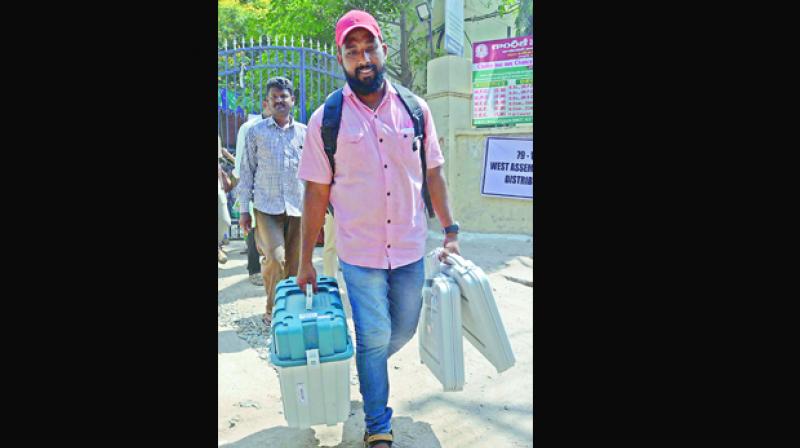A massive electoral exercise

Today is the last day of the seven- week long 2019 general elections to the 17th Lok Sabha, along with four states that also went to polls. It has been a Herculean task for completing the most massive democratic exercise in human history, involving an electorate of 900 million. Thursday, May 23, the day on which the results will be declared is just three days away. The moral code of conduct which came into force on March 10, will end after the completion of the electoral process. At a lecture-meeting jointly organised by the Centre for Policy Studies and Visakhapatnam Public Library on 'The importance of model code of conduct in ensuring free and fair elections', on Thursday last,
Dr E.A.S. Sarma observed that free and fair elections constitute the oxygen for democracy and moral code of conduct is essential for the electoral process to be fair and free. He was critical of the Election Commission of India for 'failing to be impartial' and came down heavily on the Prime Minister, Union finance minister and the AP Chief Minister for trying 'to subvert the moral code.' "People's trust is vital for the success of democracy and ECI must function like a guardian of public trust, not as a wing of the political executive," he said. He recalled how election commissioners like T.N. Seshan and J.M. Lyngdoh took firm steps to check electoral malpractices and raised the stature of ECI. He also narrated how girijans, mostly women, have participated in preparing 'people's manifesto' and how Dalit women of the local Ambedkar Colony courageously exposed the misdeeds of a former MLA. Exhorting youth and women to take the lead in cleansing politics of corrupt practices and criminal elements, Sarma revealed how he and his social activist friends have filed cases against the top leaders for 'violating Constitutional norms and procedures.'
The importance of MCC
A reference was made at the meeting to the evolution of moral code of conduct (MCC) and the role played by Prime Minister Jawaharlal Nehru in successfully holding the first general election during 1951-1952, despite strong opposition, under the stewardship of Sukumar Sen, the first election commissioner of India. The electorate then consisted of 176 million eligible voters which has crossed the 900 million mark in 2019. Speakers felt that the officials in-charge are being bullied by those in power which is against democratic norms. The recent past has witnessed the de-professionalisation of civil service, particularly the police force which is the main instrument of enforcement of the code and custodian of law and order. May peace return to the nation sooner than later!

